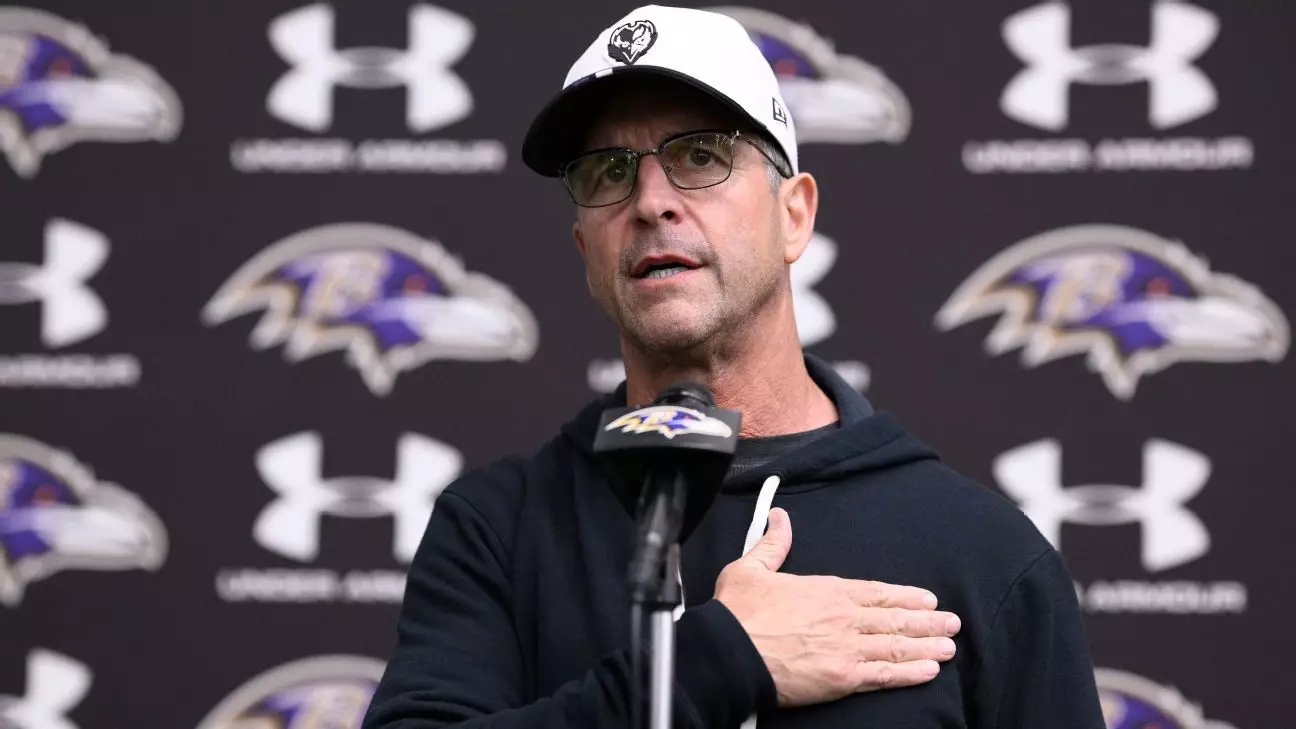In the world of professional sports, decisions often carry weight far beyond the immediate implications for a team’s performance. This sentiment rings profoundly true for the Baltimore Ravens, particularly in their recent handling of the Justin Tucker affair. Head coach John Harbaugh’s acknowledgment of a “complex decision-making process” reveals the layers of difficulty surrounding Tucker’s release. At the crux of the matter, not only was the release prompted by allegations of sexual misconduct but it seemed to echo a deeper concern about the team’s reputation, morale, and its overall trajectory heading into a new season.
The Ravens, long known for their fierce competitiveness and resilience, now found themselves at a crossroads both ethically and strategically. The discussion revolving around Tucker, who many herald as the best kicker in NFL history, centered around the intersection of athletics and ethics. Was it strictly a football decision? Harbaugh’s insistence that it was, raises eyebrows. When a player faces such serious allegations, the ramifications extend well beyond their field performance.
While Harbaugh and other Ravens executives may have navigated the decision with a focus on the football implications—preparing the team for the upcoming season—it is nearly impossible to separate performances on the field from personal conduct off of it. The Ravens’ decision was a gamble, poised at the intersection of moral responsibility and athletic necessity.
The Weight of Allegations
Justin Tucker, whose remarkable career has earned him a legendary status, now faces grave allegations from multiple massage therapists. Claims made about inappropriate conduct over a span of several years prompt seismic implications not just for Tucker but for the franchise as well. In a league striving for progress regarding interpersonal conduct and accountability, these allegations pose a critical test for both the organization and its leadership.
As of the latest reports, Tucker vehemently denies any wrongdoing, branding the accusations as “unequivocally false.” However, the sheer volume and seriousness of the claims signal a broader issue confronting sports today—how to balance monumental talents with the accountability they must shoulder off the field. There’s a growing expectation for franchises to consider both performance and personal conduct more holistically, understanding that public trust is often on the line.
Moreover, expectations for individuals in coveted roles, such as Tucker’s, are significantly higher due to their visibility and influence. As the Ravens grappled with the fallout, they had to assess the potential implications on team dynamics, fan loyalty, and corporate sponsorship—all essential components of their organization’s success.
The Timing and Its Implications
Tucker’s release came swiftly on the heels of the Ravens making history with their sixth-round draft choice, Tyler Loop—a clear signal that the team was preparing to transition. Yet, the abruptness raises questions. Why now? Why not await the NFL’s comprehensive investigation? Harbaugh’s insistence on a multi-layered decision might be interpreted as a means to rationalize a decision that could, on the surface, be seen as rash.
The Ravens’ choice risks backlash from fans who may see them as abandoning a beloved player amid unproven allegations rather than supporting him until all facts were evaluated. At the same time, the organization must safeguard its integrity in a league increasingly focused on personal accountability. When viewed against the backdrop of a franchise famed for tough decisions—whether in player trades, coaching changes, or draft picks—this decision stands as a fundamental example of the balance between moral responsibility and team prudence.
Looking Ahead: A New Kicking Era
As the Ravens embark on a new chapter without their iconic kicker, the task of filling Tucker’s shoes falls on Loop and undrafted rookie John Hoyland. The Ravens have entrusted their immediate future to relative newcomers, a strategy reminiscent of their 2012 season with Tucker—a parallel that’s as poignant as it is risky.
Both rookies have their work cut out for them, securing their place in a team narrative now built around overcoming adversity, redefining legacy, and building something new after such a pivotal and painful departure. The gravity of the challenge is significant, yet it also presents a unique opportunity—a chance to craft their marks in Ravens history while simultaneously learning under the pressure of competition.
In this new era, Harbaugh’s acknowledgment of life’s inherent risks suggests a broader awareness of the precarious balance he and his team must now navigate. For Baltimore, the stakes have become higher than a mere game; they stand at the crossroads of ethics, performance, and identity as they prepare for the imminent season. In doing so, they must forge a path that honors both their storied past and their commitment to a more responsible future.


Leave a Reply